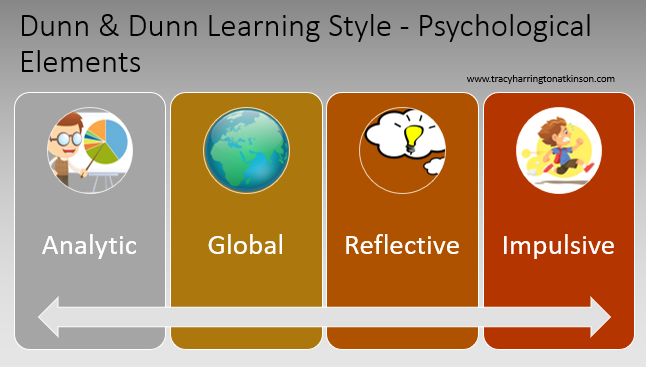
How the learner processes and responds to information and ideas is related to the psychological influences. Are they detail oriented? Global oriented? Reflective?
The elements related to psychological include:
- Analytical versus Global
- Reflective versus Impulsive
Analytical versus Global
The analytical learner likes the details. Detail-oriented. The global learner looks more at the big picture. They like to see how the information fits into a whole.
Reflective versus Impulsive
Think of reflective and impulsive as opposites -but of course, they exist on a spectrum. Reflective learners are learners that need time to ponder. They need space to contemplate new information. To identify the reflective learner, you will notice that they will take a few moments to answer a question.
In contrast the impulsive learner is swift to respond. They will quickly shoot their hands in the air to answer a question. They need little time to process.

Personalized Learning Inventory – Unlock Your Learning Potential: Discover Your Unique Style with the Dunn & Dunn Personalized Learning Assessment is a comprehensive guide that helps readers identify their individual learning preferences using the Dunn & Dunn model. This book provides an insightful assessment that allows learners to better understand their unique learning styles, focusing on key areas such as environmental, emotional, sociological, physiological, and psychological factors.
Sources:
Dunn, R. & Dunn, K. (1978). Teaching Students Through Their Individual Learning Styles: A Practical Approach. Allyn and Bacon.
Subscribe to our YouTube Channel by clicking here.
By Tracy Atkinson
Tracy Atkinson, mother of six, lives in the Southwest with her husband and spirited long-haired miniature dachshunds. She is a teacher, having taught elementary school to higher education, holding degrees in elementary education and an EDS in higher education. Her passion is researching, studying and investigating the attributes related to self-directed learners and learning styles. She has published several titles, including MBTI Learning Styles: A Practical Approach, The Art of Learning Journals, Calais: The Annals of the Hidden, Lemosa: The Annals of the Hidden, Book Two, Rachel’s 8 and Securing Your Tent. She is currently working on a non-fiction text exploring the attributes of self-directed learners: The Five Characteristics of Self-directed Learners.

Comments are closed